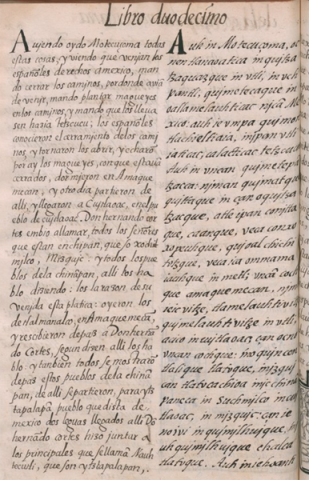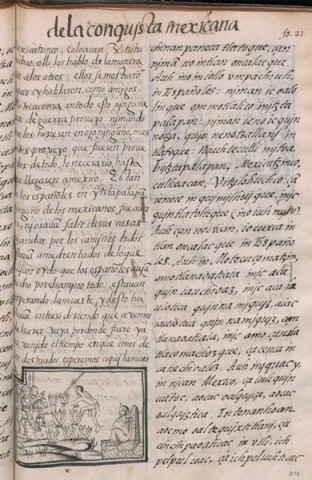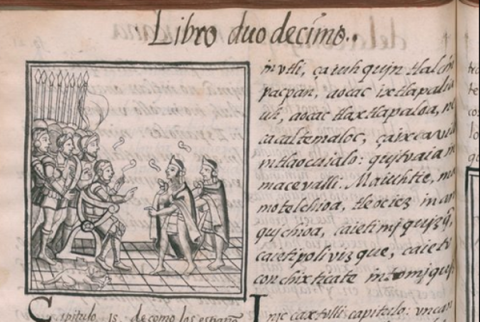 |
[Transcription of the Nahuatl (right-hand column) by James Lockhart:]
[f. 20r., cont.] Inic matlactli onnavi capitulo, vncan mitoa in quenin Motecuçoma tlanaoati in motzatzaquaz vtli inic amo velaciquivi Españoles, in nicā mexico.
|
[Translation of the Nahuatl (right-hand column) by James Lockhart:]
Fourteenth chapter, where it is said how Moteucçoma gave orders for the roads to be closed so that the Spaniards could not get to Mexico here.
[Translation of the Spanish (left-hand column) by James Lockhart:]
Chapter Fourteen, of how Moteucçoma ordered the roads closed so that the Spaniards would not reach Mexico.
|
[Translation of the Nahuatl into Spanish by Fr. Bernardino de Sahagún; transcription of the Spanish (left-hand column) by James Lockhart:]
[f. 20r., cont.] Capitulo .14. de como Motecuçoma mādo cerrar los caminos por que los españoles no llegasen a Mexico.
|
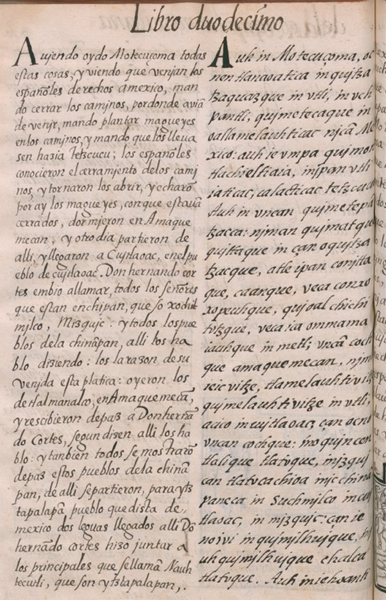 |
[Transcription of the Nahuatl (right-hand column) by James Lockhart:]
[f. 20v.] Auh in Motecuçoma, oc nen tlanaoatica in quitzatzaquazque in vtli, in vchpantli, quimetecaque inoallamelauhticac nicā Mexico: auh ie vmpa quimontlachieltiaia, in ipan vtli iaticac, calacticac tetzcucu.
Auh in vncan quimetepātzacca: niman quimatque,quittaque in çan oquitzatzacque, atle ipan conittaque, caanque, veca conxoxopeuhque, quioalchichitotzque, veca ica ommamaiauhque in metl:
vncā cochque amaquemecan, nimā ie ic vitze, tlamelauhtivitze, quimelauhtivitze in vtli, acico in cuitlaoac, çan oc no vncan cochque: in oquincentlaliquetlatoque, in izquican tlatocachioa inic chināpaneca in Suchmilco in cuitlaoac, in mizquic: çan ie no ivi in quimilhuique, in iuh quimilhuique chalcatlatoque.* Auh in iehoanti
----------
*CHALCATLATOQUE. It seems that a section on the Spanish entry into Chalco is missing. The Spanish version apparently tries to make up for it after the fact.
|
[Translation of the Nahuatl (right-hand column) by James Lockhart:]
And in a vain attempt Moteucçoma ordered that the roads and highways be closed off in various places. They planted magueys in the road coming straight to Mexico here, directing them [instead] onto the road going into Tetzcoco.
And where they had closed the road with a wall of maguey, [the Spaniards] immediately recognized it, they saw that they had just blocked it, and they disregarded it. They took the magueys, kicked them far away, sent them flying, hurled them far off to the side.
They spent the night at Amaquemecan, then came straight on along the road and reached Cuitlahuac, where they also spent the night. They assembled the rulers from each of the kingdoms among the chinampa people: Xochimilco, Cuitlahuac, Mizquic. They told them what they had told the rulers of Chalco. And the
[Translation of the Spanish (left-hand column) by James Lockhart:]
After Moteucçoma had heard all these things, seeing that the Spaniards were coming straight to Mexico, he ordered the roads closed. He ordered magueys planted in the roads they would have to pass, and he ordered them to direct them toward Tetzcoco.
But the Spaniards recognized the closing of the roads and opened them up again, casting aside the magueys with which they were closed.
They slept the night in Amaquemecan; the next day they departed from there and reached Cuitlahuac. In the settlement of Cuidahuac don Hernando Cortés sent to summon all the lords who are in the chinampa territory, that is, Xochimilco, Mizquic, and all the settlements of the chinampa country. There he spoke to them, telling them why he had come. The people of Tlalmanalco heard this speech in Amaquemecan, and received don Hernando Cortés peacefully. According to what is said, he spoke to them there. And also all these settlements of the chinampa country showed their peaceful intent.
From there they departed for Itztapalapan, a settlement two leagues distant from Mexico. On their arrival there, don Hernando Cortés assembled the leaders called the Nauhteuctli [four lords], of Itztapalapan,
|
[Translation of the Nahuatl into Spanish by Fr. Bernardino de Sahagún; transcription of the Spanish (left-hand column) by James Lockhart:]
[f. 20v.] Auiendo oydo Motecuçoma todas estas cosas, y viendo que venían los españoles derechos a mexico, mando cerrar los caminos, por donde aviā de venir, mando plantar magueyes en los caminos, y mando que los lleuasen hazia Tetzcucu;
los españoles conocieron el cerramiento de los caminos, y tornaronlos abrir, y echarō por ay los magueyes, con que estauā cerrados,
dormieron en Amaquemecan, y otro dia partieron de alli, y llegaron a Cuitlaoac, en el pueblo de cuitlaoac. Don hernando cortes embio a llamar, todos los señores que estan en chipan,* que so xochimilco, Mizquic: y todos los pueblos de la chināpan, alli los hablo diziendo: los la razon de su venida esta platica: oyeron los de dalmanalco, en Amaquemecā, y rescibieron de paz a Don hernādo Cortes, segun dizen alli los hablo: y tanbien todos se mostrarō de paz estos pueblos de la chināpan,
de alli se partieron, para ytztapalapā pueblo que dista de mexico dos leguas llegados alli Dō hernado cortes hizo juntar a los principales que se llamā Nauhtecutli, que son ytztapalapan,**
----------
*CHIPAN. For "chinapan" or the like.
**YTZTAPALAPAN. The manuscript has a period in addition to a comma after this word.
|
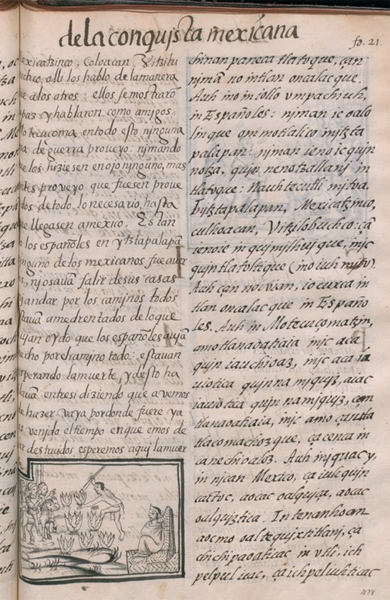 |
[Transcription of the Nahuatl (right-hand column) by James Lockhart:]
[f. 21r.] chinanpaneca tlatoque, çan nimā no intlan oncalacque.
Auh in o iniollo vmpachiuh, in Españoles: niman icoalolinque ommotlalico in itztapalapan: niman ie no icquinnotza, quinnenotzallani in tlatoque: Nauhtecutli mitoa. In itztapalapan, Mexicatzinco, culhoacan, Vitzilobuchco: çā ie no ie in quimilhuique, inic quintlatoltique (in o iuh mito). Auh çanno ivian, iocuxca intlanoncalacque in Españoles
Auh in Motecuçomatzin, amo tlanaoatiaia inic aca quiniauchioaz, inic aca iauiotica quinnamiquiz, aiac iauiotica quinnamiquiz, çan tlanaoatiaia, inic amo çan tlacomachozque,* ça cenca inca nechioaloz.
Auh in iquac y, in nican Mexico, ça iuhquin cactoc, aocac oalquiça, aocac oalquiztica. In tenanhoan aocmo oaltequixtitlani, ça chichipaoaticac in vtli, ichpelpulicac, ça ichpeliuhticac
----------
*TLACOMACHOZQUE. Read "tlacamachozque."
|
[Translation of the Nahuatl (right-hand column) by James Lockhart:]
rulers of the chinampa people also submitted to them.
And when the Spaniards were satisfied, they moved on this way and made a halt in Itztapalapan. Then they summoned, had summoned the rulers there as well, called the Four Lords, of Itztapalapan, Mexicatzinco,Colhuacan, and Huitzilopochco. They talked with them in the same way they had spoken to [the chinampa people] (as was said). And they too peacefully submitted to the Spaniards.
Moteucçoma did not give orders for anyone to make war against them or for anyone to meet them in battle. No one was to meet them in battle. He just ordered that they be strictly obeyed and very well attended to.
And at this time there was silence here in Mexico. No one went out any more; mothers no longer let [their children] go out. The roads were as if swept clean, wide open,
[Translation of the Spanish (left-hand column) by James Lockhart:]
Mexicatzinco, Colhuacan, and Huitzilopochco. There he spoke to them in the same manner as to the others; they showed their peaceful intentions and spoke as friends.
During all this time Moteucçoma neither took warlike measures nor ordered that they cause [the Spaniards] any annoyance; rather he decreed that they be provided everything necessary until they should reach Mexico.
While the Spaniards were in Itztapalapan, none of the Mexica went to see them, nor did they dare come out of their houses or go about the roadways. They were all intimidated by what they had heard that the Spaniards had done all along the way. They were awaiting death, and they spoke of it among themselves, saying, "What are we to do? Let it take its course; the time has come when we are to be destroyed. Let us await death here."
|
[Translation of the Nahuatl into Spanish by Fr. Bernardino de Sahagún; transcription of the Spanish (left-hand column) by James Lockhart:]
[f. 21r.] Mexicatzinco, Coloacan. Vitzilupuchco, alli los hablo de la manera que a los otros: ellos se mostrarō de paz y hablaron como amigos
Motecuçoma en todo esto ninguna cosa de guerra proueyo: ni mando que los hiziesen enojo ninguno, mas antes proveyó que fuesen proueydos de todo lo necesario, hasta que llegasen a mexico.
Estando los españoles en ytztapalapā ninguno de los mexicanos fue a uerlos, ni osauā salir de sus casas ni andar por los caminos todos estauā amedrentados de lo que auian oydo que los españoles auiā hecho por el camino todo: estauan esperando la muerte, y desto hablauā entre si diziendo que avernos de hazer vaya por donde fuere ya es venido el tiempo en que emos de ser destruidos esperemos aqui la muerte.
|
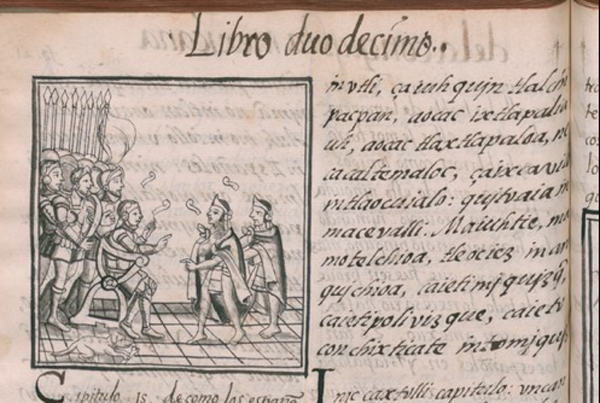 |
[Transcription of the Nahuatl (right-hand column) by James Lockhart:]
[f. 21v.] in vtli, ça iuhquin tlalchipacpan, aocac ixtlapal iauh, aocac tlaxtlapaloa, necacaltemaloc, ça ixcavilo in tlaocuialo: quitoaia in macevalli. Ma iuhtie, ma motelchioa, tle oc iez in anquichioa, ca ie timiquizq̄, ca ie tipolivizque, ca ie toconchixticate in tomiquiz.
|
[Translation of the Nahuatl (right-hand column) by James Lockhart:]
as if at dawn, with no one crossing. People assembled in the houses and did nothing but grieve. The people said, “Let it be that way; curses on it. What more can you do? For we are about to die and perish, we are awaiting our deaths.”
[Translation of the Spanish (left-hand column) by James Lockhart:]
(intentionally blank)
|
[Translation of the Nahuatl into Spanish by Fr. Bernardino de Sahagún; transcription of the Spanish (left-hand column) by James Lockhart:]
[f. 21v., la parte de arriba; un dibujo; sin texto en español]
|

